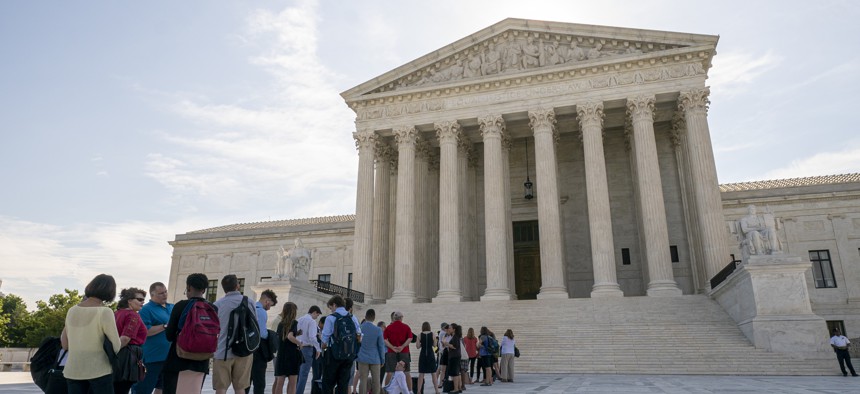Supreme Court Upholds Right of States and Federal Government to Prosecute for Same Crime

Visitors line up at the Supreme Court in Washington as the justices prepare to hand down decisions, Monday, June 17, 2019. J. Scott Applewhite/AP Photo
The 7-2 ruling affirms an exception to “double jeopardy” protections, finding that states and the federal government are “separate sovereigns” with the ability to prosecute an individual for the same offense.
States and the federal government can separately prosecute a person for the same offense, the U.S. Supreme Court affirmed Monday in a decision that upholds state and federal government dual-sovereignty rights.
The 7-2 ruling, which was being closely watched because of its implications for cases involving associates of President Donald Trump, means state and federal prosecutors can continue to bring criminal charges for the same alleged crimes without running afoul of the double jeopardy clause in the Fifth Amendment.
The case involved an Alabama man, Terance Martez Gamble, who was prosecuted by both state and federal officials for possession of a firearm after he had been convicted of a felony.
A police officer pulled over Gamble in 2015 for a faulty headlight and searched the vehicle after smelling marijuana. Inside the car, the officer found two baggies of marijuana and a 9mm handgun. Gamble, who was convicted of felony robbery in 2008, was not legally allowed to possess a firearm and he pleaded guilty to state charges and received a one-year sentence.
While Alabama’s case was ongoing, however, the federal government also brought gun possession charges against Gamble for the same incident. Gamble received a three-year prison sentence for the federal charge.
The Fifth Amendment protects individuals from “being twice put in jeopardy” for “the same offence.” Citing historical precedent, the Supreme Court affirmed that both state and federal governments have a right to prosecute an individual because each entity has its own laws constituting what counts as a crime.
“As originally understood, then, an ‘offence’ is defined by a law, and each law is defined by a sovereign. So where there are two sovereigns, there are two laws, and two ‘offences,’” wrote Justice Samuel Alito for the court.
A coalition of 36 states submitted a brief urging the court to uphold the dual-sovereignty doctrine, arguing that states’ police powers would be weakened if their ability to prosecute crimes was curtailed by actions taken by federal prosecutors.
“If state sovereignty is to have real meaning, a State must be free to prosecute crimes against its legitimate interests irrespective of the actions of other, separate sovereigns,” the states argued.
Gamble’s attorneys asked the high court to overturn the dual-sovereignty doctrine, arguing that it “survives only as a remnant of a bygone constitutional era—‘the kind of doctrinal dinosaur or legal last-man-standing.’”
The case has attracted broad attention because of its possible implications for Paul Manafort, President Trump’s former campaign chairman, and other Trump associates. Manafort was convicted in federal court of conspiracy and tax fraud charges and he was sentenced to more than seven years in prison. In addition to the federal charges, Manafort was also charged by state prosecutors in New York.
Trump could pardon Manafort of a federal conviction, but presidential pardon powers do not extend to state convictions. If the Supreme Court had ruled in Gamble’s favor, it could have curtailed New York’s ability to bring the additional case against Manafort.
Justices Ruth Bader Ginsburg and Neil Gorsuch dissented from the court’s opinion.
“The notion that the Federal Government and the States are separate sovereigns overlooks a basic tenet of our federal system,” Justice Ginsburg wrote. “States may be separate, but their populations are part of the people composing the United States.”
Addressing the separate dissents, Justice Alito compared the right for both states and the federal government to prosecute individuals to other overlays of state and federal law.
“[B]ecause the powers of the Federal Government and the States often overlap, allowing both to regulate often results in two layers of regulation,” Justice Alito wrote for the court. “Taxation is an example that comes immediately to mind. It is also not at all uncommon for the Federal Government to permit activities that a State chooses to forbid or heavily restrict—for example, gambling and the sale of alcohol.”
Andrea Noble is a staff correspondent for Route Fifty.
NEXT STORY: No African American Has Won Statewide Office in Mississippi in 129 Years—Here's Why





